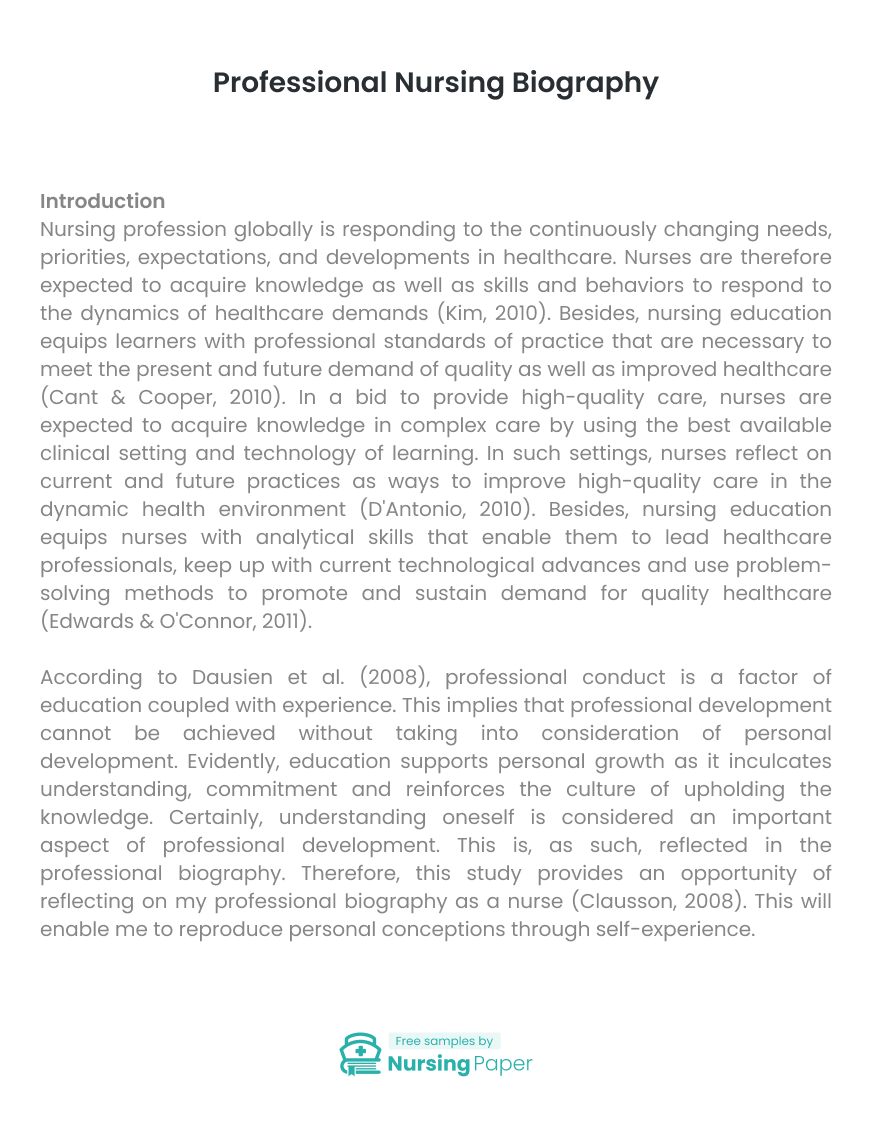1. Alligood, M. R. (2014). Nursing theorists and their work. Elsevier Health Sciences.
2. Andrews, M., Brewer, M., Buchan, T., Denne, A., Hammond, J., Hardy, G., … & West, S. (2010). Implementation and sustainability of the nursing and midwifery standards for mentoring in the UK. Nurse Education in Practice, 10(5), 251-255.
3. Baldacchino, D. R. (2008). Teaching on the spiritual dimension in care to undergraduate nursing students: the content and teaching methods. Nurse Education Today, 28(5), 550-562.
4. Beal, J. A. (2012). Academic-service partnerships in nursing: an integrative review. Nursing Research and Practice, 2012.
5. Bornat, J. (2008). Biographical methods. The Sage handbook of social research methods, 343-355.
6. Buerhaus, P. I. (2008). Current and future state of the US nursing workforce. JAMA, 300(20), 2422-2424.
7. Campion-Smith, C., Austin, H., Criswick, S., Dowling, B., & Francis, G. (2011). Can sharing stories change practice? A qualitative study of an interprofessional narrative-based palliative care course. Journal of interprofessional care, 25(2), 105-111.
8. Cant, R. P., & Cooper, S. J. (2010). Simulation‐based learning in nurse education: systematic review. Journal of advanced nursing, 66(1), 3-15.
9. Charalambous, A., & Beadsmoore, A. (2009). Towards a theory of quality nursing care for patients with cancer through hermeneutic phenomenology. European Journal of Oncology Nursing, 13(5), 350-360.
10. Clausson, E. K. (2008). School health nursing: perceiving, recording and improving schoolchildren’s health (Doctoral dissertation, Nordic School of Public Health (NHV)).
11. Cleary, M., Horsfall, J., O’Hara‐Aarons, M., Jackson, D., & Hunt, G. E. (2011). The views of mental health nurses on continuing professional development. Journal of clinical nursing, 20(23‐24), 3561-3566.
12. Crawford, P., Brown, B., Kvangarsnes, M., & Gilbert, P. (2014). The design of compassionate care. Journal of clinical nursing, 23(23-24), 3589-3599.
13. D’Antonio, P. (2010). American nursing: A history of knowledge, authority, and the meaning of work. JHU Press.
14. Dausien, B., Hanses, A., Inowlocki, L., & Riemann, G. (2008, January). The analysis of professional practice, the self-reflection of practitioners, and their way of doing things. Resources of biography analysis and other interpretative approaches. In Forum Qualitative Sozialforschung/Forum: Qualitative Social Research (Vol. 9, No. 1).
15. East, L., Jackson, D., O’Brien, L., & Peters, K. (2010). Storytelling: an approach that can help to develop resilience: Relating personal experiences can help participants to cope with their conditions and improve research, explain Leah East, Debra Jackson, Louise O’Brien and Kathleen Peters. Nurse Researcher, 17(3), 17-25.
16. Edwards, J., & O’Connor, P. A. (2011). Improving Technological Competency in Nursing Students: The Passport Project. Journal of Educators Online, 8(2), n2.
17. Fook, J., & Gardner, F. (2007). Practising critical reflection: A resource handbook: A handbook. McGraw-Hill Education (UK).
18. Forneris, S. G., & Peden‐McAlpine, C. (2007). Evaluation of a reflective learning intervention to improve critical thinking in novice nurses. Journal of advanced nursing, 57(4), 410-421.
19. Holland, K., Roxburgh, M., Johnson, M., Topping, K., Watson, R., Lauder, W., & Porter, M. (2010). Fitness for practice in nursing and midwifery education in Scotland, United Kingdom. Journal of clinical nursing, 19(3‐4), 461-469.
20. Johns, C. (2009). Guided reflection: Advancing practice. John Wiley & Sons.
21. Kim, H. S. (2010). The nature of theoretical thinking in nursing. Springer Publishing Company.
22. Kinsella, E. A. (2010). Professional knowledge and the epistemology of reflective practice. Nursing Philosophy, 11(1), 3-14.
23. Mantzoukas, S., & Watkinson, S. (2007). Review of advanced nursing practice: the international literature and developing the generic features. Journal of Clinical Nursing, 16(1), 28-37.
24. Masters, K. (2015). Role development in professional nursing practice. Jones & Bartlett Publishers.

The download will start shortly.






 Subject:
Subject:
 Number of pages: 2
Number of pages: 2